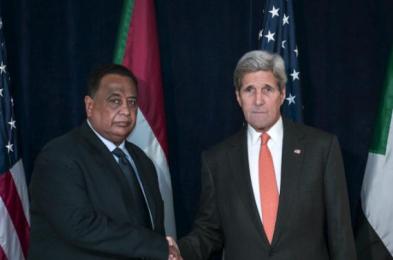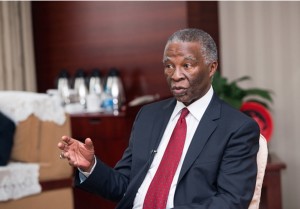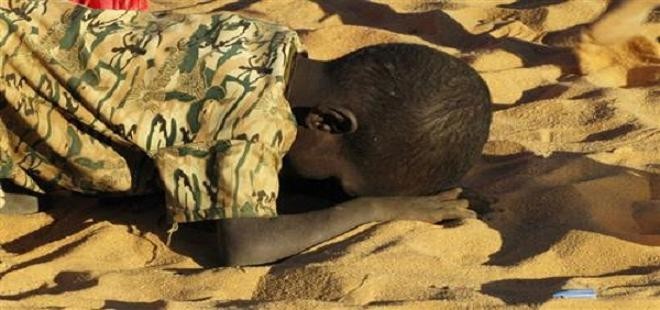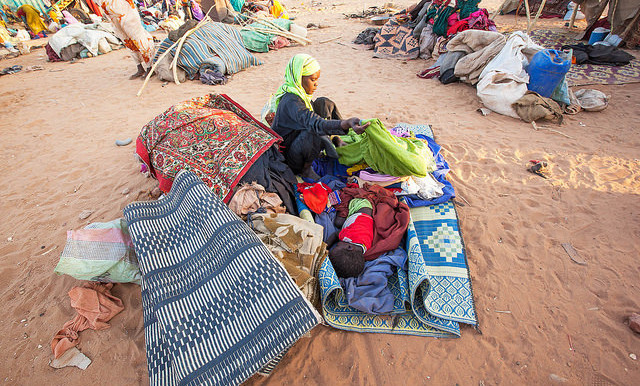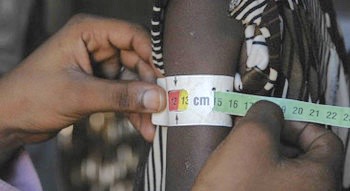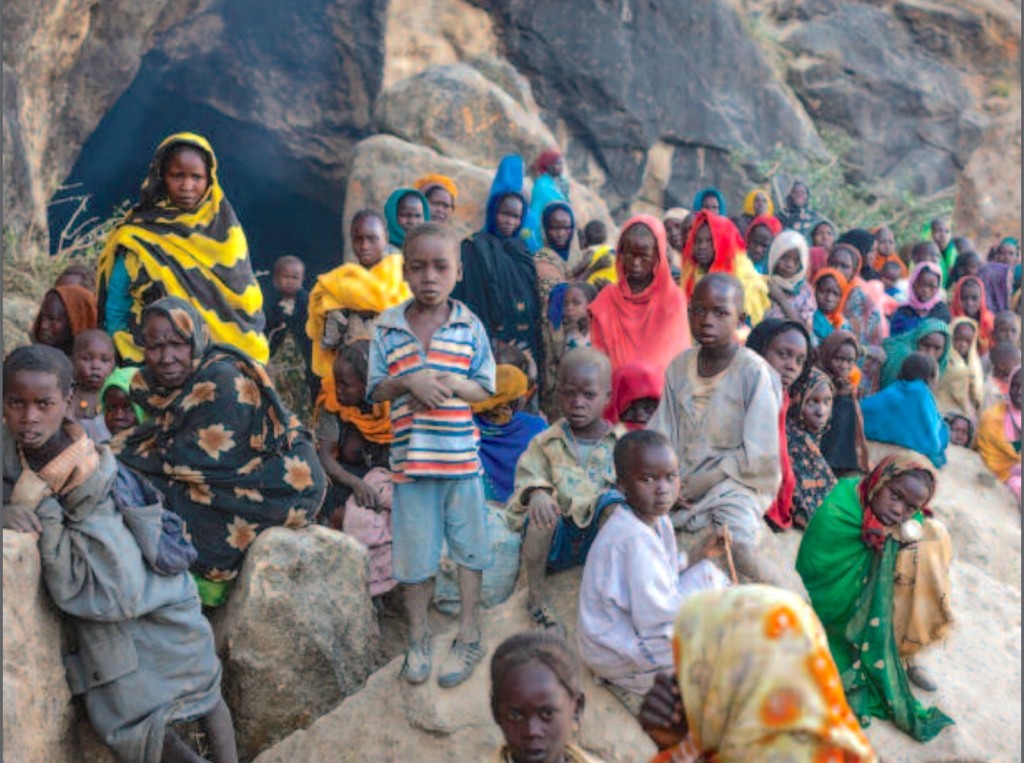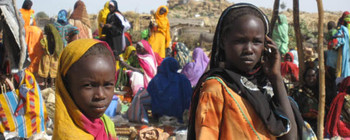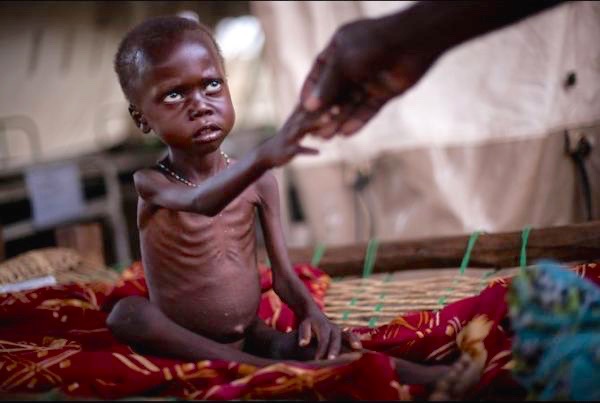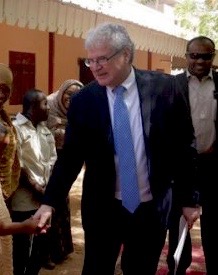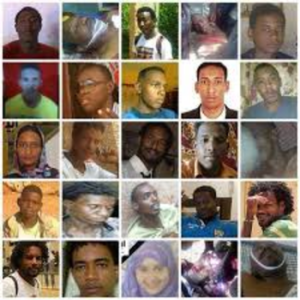Darfur and Sudan Following the Visit by U.S. Special Envoy Donald Booth: Undiminished catastrophes
Eric Reeves | August 28, 2016 | http://wp.me/p45rOG-1VI
On his visit to Darfur one month ago (July 26 – 28, 2016) U.S. special envoy for the Sudans Donald Booth was engaged in assessing conditions in the Jebel Marra region and adjacent locations in the wake of Khartoum’s savage military assault on the Jebel Marra massif beginning last January. He spoke to a number of people in the area of the Nierteti camps, as well as the spontaneous Sortony camp in North Darfur, to which many fled from the bombing and slaughter.
Although this provided Ambassador Booth with useful information from informed individuals on the ground in Darfur, the broad outlines and many of the details of the Jebel Marra assault were well known to the office of the Special Envoy beforehand. Moreover, following his trip to Nierteti, some twenty men he spoke with were “detained”/arrested by Khartoum’s security services for daring to speak the truth. As of this writing, most men have been released but several of those arrested have not. They are at grave risk, and that risk only increases the longer they are held.
Obama administration Special Envoy for the Sudans Donald Booth
The Obama administration Press Office issued a statement on August 12—sixteen days ago—declaring that the administration was “gravely concerned” about the detentions and made clear that responsibility for the arrests lay with the Khartoum regime, referring to “the Sudanese government’s ongoing detention of at least 15 Darfuri individuals.” For its part, the Khartoum regime continues to lie baldly about the issue:
Foreign Affairs Minister Ibrahim Ghandour denied the existence of political detainees. He told the press in Khartoum that he had contacted the security apparatus in Nierteti who reported that they had not detained any displaced. (Radio Dabanga | August 22, 2016)
As of this date (August 28, 2016), there has been no word from the Obama administration in the face of this denial of what the U.S. government knows perfectly well is the case. Moreover, Sudan Tribune—reporting on a meeting of August 24 between Obama administration Secretary of State John Kerry and Khartoum’s Foreign Minister Ibrahim Ghandour (in Nairobi)—gives no indication that Kerry expressed concern about the fate of the men detained in Darfur solely for meeting a senior Obama administration diplomat.
Khartoum’s Foreign Minister Ibrahim Ghandour meeting with Obama administration Secretary of State John Kerry (in Nairobi). Kerry has over the past eight years been a disastrous political and diplomatic force in determining U.S. Sudan policy, both in the Senate and as Secretary of State.
What Ambassador Booth left in the wake of his visit: current reporting
We can’t know precisely what was said to Booth by those he chose to interview—and to put at severe risk. But Sudan Tribune, Radio Tamazuj, Nuba Reports, and Radio Dabanga (RD) (it was from the latter that we first learned of the “detentions”/arrests) have given us a clear picture of the conditions in Darfur as they exist in the wake of Booth’s visit as well as the response of the Khartoum regime to Booth’s “intrusion.” The past month has also seen considerable reporting about other regions of Sudan from the sources noted above. If the ultimate goal of the Booth mission—and the Kerry meeting with Khartoum’s Ghandour—was to improve conditions in Darfur and the rest of Sudan, to pressure the Khartoum regime into a more tractable posture on humanitarian access, security, and cease-fire negotiations, it is sadly the case that developments in the weeks following Booth’s departure from Khartoum make clear just how very little success Obama administration diplomatic efforts have had. The Darfur Bar Association is a painful portrait of impotence without meaningful U.S. support:
Darfur Bar demands release of Nierteti detainees | RD | August 15, 2016 | KHARTOUM |
“We fear that the detained may be subjected to mistreatment and torture,” Mahmoud added. “Among the detained are a number of elderly people who suffer from chronic diseases, and need regular medical care. By detaining them, the security apparatus is depriving them of their constitutional right to human dignity.”
Below is the most recent dispatch from any Sudanese news outlet on the fate of the men arrested for meeting with Ambassador Booth, but sources in Darfur confirm that several of these men are still in custody of the National Intelligence and Security Services.
Radio Dabanga (RD) | August 22, 2016 | NIERTETI |
Seven of the 15 displaced people who were held after their meeting with US Special Envoy Donald Booth in Nierteti at the end of July, are still in detention. Eight were released, and two of them were banished from Nierteti for good. The seven displaced who are still in detention are Ali Abdelaziz Adam Saleh, Adam Mohamed Ali, Nasreldin Yousef Abdelrahman, Adam Hamed Adam, Ahmed Abdallah Omar, Mohamed El Tijani Seifeldin, and Ahmed Suleiman.
The U.S. State Department called for their release in a statement on 12 August. At the same time, Foreign Affairs Minister Ibrahim Ghandour denied the existence of political detainees. He told the press in Khartoum that he had contacted the security apparatus in Nierteti who reported that they had not detained any displaced. The Minister accused “unnamed parties” of “seeking to sabotage the envoy’s visit to Darfur.”
• Current conditions in Darfur:
It is the height of the rainy season currently, and fighting has diminished not only in Darfur but in South Kordofan and Blue Nile (the “Two Areas”). But despite Khartoum’s expedient declaration of a cease-fire in the Two Areas running through October, we may expect that this will end when—in October—the ground begins to dry out and harden, making heavy military equipment again mobile and transportable. As it is, Nuba Reports has recorded a number of clear violations of the cease-fire initiated by Khartoum’s forces, including aerial bombardment.
Violence in Darfur continues to be reported in ways that make clear there has been no diminishment since Booth’s visit—that rape, murder, aerial bombardment, village destruction, massive human displacement continue, as they have for the past thirteen years. The targets of the violence continue to be, overwhelmingly, the people of the African tribal groups of Darfur. In short, genocide continues in Darfur, and a world that once appeared to take this reality seriously no longer uses the word or acknowledges the suffering and destruction that is so unrelenting.
The past month makes clear just how obdurate and unaccommodating the Khartoum regime remains—not only in Darfur but in deliberately sabotaging peace negotiations in Addis Ababa, in denying the desperately urgent need for cross-border humanitarian access in the Two Areas, and in constructing genuinely open political space in Sudan.
[A subsequent analysis will focus on the breakdown of negotiations in Addis and the increasingly destructive diplomatic role played by Thabo Mbeki and the now absurdly ill-suited African Union “High Level Implementation Panel”—and the failure of the U.S. and the Europeans to ensure that humanitarian access is not enmeshed in more complex diplomatic and political issues. In their expedient haste for closer relations with Khartoum, in their cynical justifications for rapprochement with a regime guilty of serial genocidal counter-insurgencies, Europe and the U.S. continue to disgrace themselves.]
[My most recent analysis of Mbeki’s performance, “Diplomatic Incoherence: Thabo Mbeki’s Gift to the People of Darfur, South Kordofan, and Blue Nile,” was on August 5, 2016]
Thabo Mbeki, head of the absurdly named “African Union High-level Implementation Panel” (AUHIP), has nothing to “implement” because he has fashioned no acceptable diplomatic roadmap, either for Darfur (the “Implementation” part of Mbeki’s panel was added in 2009 following his deeply irrelevant “Roadmap for Peace in Darfur.” He has provided other useless “Roadmaps” subsequently. This has not prevented him from “living large”–5-star hotels, fine clothes, first-class travel, and as many amenities as he can think to ask for.
For now, in attempting to provide as comprehensive an overview as possible of the current situation in Darfur and the Two Areas, I’ve provided here a compendium of reports from the ground for the three regions, focusing on Darfur. (All emphases in bold have been added; my commentary, relatively infrequent, always appears in italics and in blue, followed by my initials.)
Life and Death in Darfur:
Kalma IDPs commemorate killed camp residents, reject Sudan’s peace roadmap | Sudan Tribune | August 26, 2016 (NYALA)
Hundreds of the Internally Displaced Persons (IDPs) in Kalma, one of largest South Darfur camps, gathered on Thursday to mark the 9th [sic—it is the eighth anniversary—ER] anniversary of killing of dozens of the camp residents at the hands of government forces.
[I published at the time of the attack a detailed account of the attack for The Wall Street Journal (with Mia Farrow, who had been to Kalma camp). The nature of the attack should still shock:
“Now Sudan Is Attacking Refugee Camps,” The Wall Street Journal, 6 September 2008 | Eric Reeves and Mia Farrow| http://online.wsj.com/article/SB122065894281205691.html?mod=googlenews_wsj
At 6am. on the morning of August 25, 2008, Kalma camp, home to 90,000 displaced Darfuris, was surrounded by Sudanese government forces. By 7am 60 heavily armed military vehicles had entered the camp, shooting and setting straw huts ablaze. Terrified civilians—who had previously fled their burning villages when they were attacked by this same government and its proxy killers the Janjaweed—hastily armed themselves with sticks, spears and knives. Of course, these were no match for machine guns and automatic weapons. By 9am, the worst of the brutal assault was over. The vehicles rolled out leaving scores dead and over 100 wounded. Most were women and children.
The early morning attack ensured that no aid workers were present as witnesses. Doctors Without Borders did manage to negotiate the transportation of 49 of the most severely wounded to a hospital in the nearby town of Nyala. But beyond this, aid workers have been blocked from entering the camp. Military vehicles have now increased in number and massed around Kalma. They have permitted no humanitarian assistance to reach the wounded. People already hard hit by recent floods and deteriorating sanitary conditions have received no food, water or medicine since Monday. The dead cannot even be buried with the white shrouds requested by the families of the victims.
We asked in this context:
How can such brazen cruelty be inflicted upon our fellow human beings? How is it that a military assault on displaced civilians in a refugee camp creates barely a ripple in the news cycle?
That question remains fully exigent today, nine years later, as violence continues to rage throughout Darfur. A particularly ominous report comes today from Radio Dabanga:
Villagers in Tawila, North Darfur, fear major herder attack | August 28, 2016 | TAWILA |
Three people were killed and more than 1,000 cows were stolen in an attack on a herder settlement in Tawila locality in North Darfur on Wednesday. In response, hundreds of armed herdsmen arrived in the area over the past few days. A farmer was killed, another abducted, and two women were gang-raped, allegedly by the herders. “The problems started on Wednesday, when a group of gunmen [they are almost certainly Khartoum-backed militiamen or other nomadic pastoralists—not the farmers facing attack—ER] stormed one of the herder settlements, about 15 kilometres west of Tawila town. They shot a man, a woman and her baby dead, and took more than 1,000 camels and cows with them to the south,” multiple sources reported to Radio Dabanga from the area.
They said that about 600 herders riding camels, horses, and motorcycles have arrived near Tawila from the direction of the South Darfur capital Nyala. 300 others have appeared in the area of Tabit from Tawila, and El Fasher. “We fear that a massacre may occur in the villages here, unless the authorities rapidly intervene,” one of the sources said. “Adam Suleiman was shot dead on his farm and Adam Hamid Eisa was abducted near Khazan Tunjur, and two women (24 and 21) were gang-raped near Dubo El Omda.” He added that at least 150 acres of farmland were destroyed as a result of trespassing livestock. “They also robbed a number of villagers of their donkeys and belongings by force of arms.”
The inability of the UN/African Union Mission in Darfur (UNAMID) to halt such violence, despite a major post nearby, is but another sign of the mission’s failing. More and more African nations that have contributed to UNAMID are withdrawing their support. The failure of the mission—and Khartoum’s unrelenting violence and hostility toward UNAMID—has left people in North Darfur, especially the Tawila area, almost completely vulnerable to assault.
‘Burkina Faso withdraws from UNAMID’: Foreign Affairs | August 26, 2016 | KHARTOUM
• Indiscriminate aerial bombardment, as well as the deliberate targeting of civilians, has been especially intense during August, typically the rainiest month of Darfur’s rainy season and most difficult for Khartoum to wage ground fighting:
Young twins killed in shelling in Darfur’s Jebel Marra | RD | August 2, 2016 | EAST JEBEL MARRA
Five members of Jebel Marra family killed in Darfur air raid | RD | August 10, 2016 | JEBEL MARRA
Woman killed by barrel bomb in Darfur’s Jebel Marra | RD | August 21, 2016 | JEBEL MARRA
Woman loses legs in Jebel Marra bombing | RD | August 3, 2016 | JEBEL MARRA
Sudanese Air Force bombs ‘empty village’ in Darfur | RD | August 18, 2016 | KHAZAN TUNJOR
Sheikh killed in Darfur air raid | RD | July 28, 2016 | JEBEL MARRA
Woman killed in air raid on Darfur’s Jebel Marra | RD | August 14, 2016 | JEBEL MARRA
Darfur: Nomads’ tents destroyed in ongoing Jebel Marra bombing | RD | August 12, 2016 | JEBEL MARRA
Three dead, five wounded in North Darfur raids | RD | August 17, 2016 | KUTUM / KABKABIYA
• The use of rape as a weapon of war continues unabated; the victims are virtually all girls or young women from the African tribal groups of Darfur:
Two girls raped in Kabkabiya, North Darfur | RD | August 21, 2016 | KABKABIYA
Five raped in Darfur’s East Jebel Marra | RD | August 9, 2016 | KATOR / TABIT
• The pervasiveness of violence on the ground can hardly be conveyed; a compendium of reports is only partially suggestive:
Five passengers shot dead in East Darfur | RD | August 5, 2016 | ED DAEIN
Stalls close as militiamen storm Central Darfur market | RD | August 3, 2016 | ZALINGEI
Farmers shot in Gireida, South Darfur | RD | August 1, 2016 | GIREIDA
Student and farmer killed in Darfur | RD | August 19, 2016 | KUTUM / MUKJAR
Is this child grieving? despairing? exhausted? badly malnourished? In Darfur, all are possible…
Dispute sparks fatal attack in South Darfur | RD | August 3, 2016 | BIELEL LOCALITY
Three farmers killed, ‘repeated nightly shootings’ in Sudan | RD | August 9, 2016 | HABILA / BURAM
Farmer shot in South Darfur robbery | RD | August 28, 2016 | GIREIDA
Six villagers held for ransom by North Darfur herders | RD | August 24, 2016 | SARAF UMRA / TAWILA
Three injured, seven missing in North Darfur highway robbery | RD | August 24, 2016 | GIREIDA / JEBEL MARRA
‘Tension rising’ between militias and regular forces in North Darfur | RD | August 10, 2016 | SARAF UMRA
Tensions between regular Sudanese Armed Forces (SAF) and paramilitary groups stationed in the Saraf Umra area in North Darfur threaten to boil-over into armed confrontation. Speaking to Radio Dabanga on Tuesday, Sheikh Abdelrazeg Yousef Suleiman, the coordinator of the Saraf Umra camps for the displaced, said that the paramilitary groups stationed in the area have held a series of meetings over the past week – most recently on Friday at Riyadh district – in which they demanded the withdrawal of the government troops who have arrived in the area. They threaten armed confrontation should the troops not be withdrawn.
[The real victims of this military confrontation will be the displaced, who enjoy at least tenuous protection by virtue of SAF presence (even as many of those in the Saraf Umra camps were displaced by SAF/militia offensives in North and Central Darfur over the past four years). The militia forces threaten not only the people of the camps but their claims to their lands, which have in countless cases been violently expropriated—see “Changing the Demography: Violent Expropriation and Destruction of Farmland in Darfur, November 2014 – November 2015,” with data spreadsheet and maps representing these data for the three major Darfur states—ER.]
North Darfur market shops burgled by ‘guards’ | RD | August 10, 2016 | SARAF UMRA
• Persons in camps for the displaced face growing threats, a determination by Khartoum to close them, even as the need for more camp capacity could hardly be clearer, especially in the wake of the Jebel Marra offensive of this year
To be displaced in Darfur
Displaced evicted from homes in South Darfur camp | RD | August 9, 2016 | NYALA |
A number of displaced families are living out in the open in a camp in South Darfur after government authorities removed 38 homes without offering alternative housing. The affected families live in Square 2 of Sakali camp for displaced people in Nyala locality. Their homes have ostensibly been removed to create space for the planned police centre in the camp, the secretary of the Darfur Displaced Women Association told Radio Dabanga. “The families, some of which have school children, are living in the open without shelter,” secretary Awatif Abdelrahman said. “The government left them to their own devices, without finding an alternative or other compensation – they have been displaced twice.”
[This is yet another egregious violation of International Humanitarian Law, and promises to be repeated with increasing frequency; it is reported by no one but Radio Dabanga—ER]
Displacement in Darfur this year mainly from and within Jebel Marra | RD | August 12, 2016 | SUDAN
A number of displaced families are living out in the open in a camp in South Darfur after government authorities removed 38 homes without offering alternative housing. The affected families live in Square 2 of Sakali camp for displaced people in Nyala locality. Their homes have ostensibly been removed to create space for the planned police centre in the camp, the secretary of the Darfur Displaced Women Association told Radio Dabanga. “The families, some of which have school children, are living in the open without shelter,” secretary Awatif Abdelrahman said. “The government left them to their own devices, without finding an alternative or other compensation – they have been displaced twice”
North Darfur displaced reject flood victim voluntary return plan | RD | August 18, 2016 | ZAMZAM CAMP |
The inhabitants of Zamzam camp near El Fasher, capital of North Darfur, have categorically rejected a plan for flood victims’ voluntary return, proposed by the Khartoum government. On Wednesday, Zamzam camp administrators and sheikhs had a formal meeting with a delegation from the National Commission for voluntary return from Khartoum and another from El Fasher. The displaced demanded security, compensation, expulsion of the new settlers from their lands, the prosecution of perpetrators of war crimes in Darfur, before they will consider voluntary return.
East Darfur villagers fear attacks after troops withdrawal | Sudan Tribune | Saturday 30 July 2016 (ED-DAEIN)
East Darfur returnees have expressed concern over government decision to withdraw military units from eight sites of voluntary return, expressing fear of attacks by armed gangs and herdsmen. A traditional leader, who requested anonymity, told Sudan Tribune that all military forces have been withdrawn from several areas without informing the Native Administration officials, pointing that poorly equipped police forces are assigned to protect civilians in these areas.
[Beginning in summer 2010, Khartoum began aggressively pushing its “New Strategy for Darfur, which on close analysis turns out to be little more than a justification for forced returns of displaced persons and an excuse for demanding an end to humanitarian assistance in the region (the time had come, the document argued, for humanitarian assistance to move to developmental assistance). But those displaced persons returning voluntarily to their new villages often found insecurity completely inadequate—some were killed or raped, others returned to the camps they had left. There have been some successful returns, both by displaced persons and refugees in eastern Chad, but their number has been grossly overstated—and there is typically little follow-up on such reports. The example reported by Sudan Tribune is much more characteristic of this cynical effort by Khartoum, supported by former Obama administration special envoy Scott Gration and the AU’s Mbeki—ER]
‘No displaced returned to Kabkabiya’: North Darfur camp leader | RD | August 26, 2016 | KABKABIYA
The coordinator of camps for displaced people in Kabkabiya has denied reports that hundreds of displaced people have returned to their villages in Jebel Si. “There is still insecurity and militiamen roam there.” Coordinator Adam Juma told Radio Dabanga that a statement by former rebel leader Sudan Jameel earlier this week is not correct. No displaced people have returned from Kabkabiya and Sortony camps to Jebel Si administrative unit or Kawra area, to their villages.
[Over many years, Khartoum has frequently found it easier to buy off the opposition leaders than to defeat them militarily. In the case of former rebel leader Sudan Jameel, he is meant to give legitimacy to the false claim that there have been “returns” on the part of people displaced by the regime’s continuing Jebel Marra military offensive—ER]
East Darfur returnees fear attacks as military forces withdraw | RD | August 1, 2016 | EAST DARFUR
Formerly displaced people who have returned to their villages in East Darfur have expressed concern about the government’s withdrawal of the garrisons in their areas. The withdrawal of military forces from Muhajiriya, Labado, Khazan Jadeed, Selea, Sani Efendo, Kileikil Mojo, and Kileikil Abu Salama sparked panic among the returnees, a native administration leader informed Radio Dabanga on Sunday.
He explained that most of the people returned to tend their farms during the current agricultural season. The presence of the military forces in these areas of return offered protection against attacks by militiamen and armed herders. “The state government has withdrawn the garrisons from several areas without prior notice. They left the responsibility to protect the lives and property of the people to the police stations which, as we all know, are too short of equipment to confront any incident.”
• Humanitarian conditions continue to be appalling:
Central Darfur displaced request return of food rations | RD | July 31, 2016 | HAMIDIYA CAMP
Far too many children in Darfur suffer from Acute Malnutrition or Severe Acute Malnutrition (most of the latter not in a hospital, clinic, or therapeutic feeding center will die)
Medicine heist from North Darfur hospital, pharmacy | RD | August 22, 2016 | BIRKAT SEIRA
OCHA: ‘Spike in acute malnutrition in West Darfur’ | RD | August 28, 2016 | KHARTOUM
Over the past few months, the West Darfur Ministry of Health has reported high rates of severe acute malnutrition in the state.
This reflects diminishing humanitarian capacity, the continuing refusal by the Khartoum regime to help its own Sudanese citizens, and the effects—even in Darfur—of the broad economic collapse in Sudan—ER]
Cover photograph for Human Rights Watch report on violence in Darfur by Khartoum’s primary militia force, the Rapid Support Forces (RSF): “Men with No Mercy” (September 2015)
Doctors strike in North Darfur capital | RD | August 2, 2016 | EL FASHER
North Darfur: Zamzam camp’s cash-strapped preschools close | RD | August 8, 2016 | ZAMZAM CAMP
No school for children in Sortony, North Darfur | RD | July 29, 2016 | SORTONY
Funding shortfall for Darfuri refugee students in Chad | RD | August 28, 2016 | N’DJAMENA, Chad
[Humanitarian resources for the more than 300,000 Darfuri refugees in eastern Chad continue to be appallingly inadequate, particularly in schooling using the standard Sudanese (Arabic) curriculum—ER]
Darfuri children in Toulum refugee camp, lying west of North Darfur, where violence is (along with Central Darfur) most intense
OCHA Humanitarian Bulletin | Sudan | Aug 1 – 7, 2016 | Concerns in Sortony, North Darfur
Cases of suspected Acute Jaundice Syndrome (AJS) continue to be reported in Sortony, North Darfur, according to SMoH. Confirmation of the total number of cases will be available soon. Sortony hosts over 21,000 people who were displaced from Jebel Marra following hostilities earlier this year. Seven samples sent for analysis tested positive for Hepatitis E virus, according to WHO. There are significant health risks arising as a result of over 4,500 livestock living in close proximity to the IDPs in Sortony.
Issue 26 | OCHA Weekly Humanitarian Bulletin Sudan | Violence in Thur, Central Darfur | June 26, 2016
An estimated 17,000 people fled Thur village and Thur East gathering for internally displaced persons (IDPs) in Central Darfur and sought refuge near a Sudan Armed Forces (SAF) military base (2km from Thur), after the area was attacked by armed militia on 20-21 June. According to media reports, five people were killed and 13 injured, while the market and houses in the area were looted and torched…
Response needed for 17,000 people
Preliminary reports indicate that there is a need for a full emergency response for 17,000 people, of whom 12,000 were living in the IDP gathering prior to the violence. An estimated 5,000 are from the host community and reportedly joined the people in the camp after their shelters were looted and torched during the violence, but no verification exercise has been carried out as yet to determine the exact number of people in need. Verification results are expected from the authorities after Eid.
Food, water and sanitation, shelter and health are the priority concerns. Meanwhile, physical protection has been restored as UNAMID has resumed patrols in and around Thur East IDP camp. Most humanitarian action in Thur is carried out through line ministries. The nearest locations with presence of with local humanitarian organisations are Nertiti or Zalingei. The international NGO Islamic Relief Worldwide (IRW) recently provided a medical/nutrition response, and had set up a primary healthcare clinic in Thur which was reportedly looted and partially burned.
Inter-communal violence in Um Tajok, West Darfur
Humanitarian organisations have temporarily suspended their operations since armed clashes began between pastoralists and farmers in Um Tajok village, Kereinik locality in West Darfur on 22 June. According to government sources, 22 people have been killed, 12 people wounded, and three villages burnt down. The organisations which provide basic services, have moved their staff to the state capital, El Geneina. This may have an impact on the delivery of basic services for the local community, if activities cannot resume soon. Government security forces have been dispatched to the area, but the security situation is reported to be tense.
Twenty-two people reportedly killed and twelve wounded during inter-communal violence in Um Tajok, West Sudan been displaced from the surrounding villages of Um Dalba-Kabir, Um Dalba-Sakhier, AmarJadid, Gereida, and Umdukhun to Um Tajok town. This is the second time in 2016 that inter-communal violence has taken place in Um Tajok; the previous incident occurred in February 2016. In recent years, the security situation in West Darfur has been relatively stable compared to other Darfur states [“relatively stable” is a deeply disingenuous phrase, given the level of violence that has been reported by Radio Dabanga—ER], but recent months have seen increased inter-communal tension and conflict, mainly between pastoralists and farmers over access and control of resources.
Five children die in South Darfur camp deluge | RD | August 17, 2016 | KALMA CAMP
Five children have died and at least 1,500 homes and shelters collapsed in the heavy rains and consequent flash floods that struck Kalma camp for the displaced near Nyala in South Darfur. Saleh Eisa, the secretary-general of camp Kalma told Radio Dabanga on Tuesday that 1,500 families are affected in the camp. “They are living in the open and sleeping on the ground in extremely inhumane conditions, amid a complete absence of humanitarian organisations and official bodies.”
He explained that the floods and rains also led to the collapse of 200 latrines in the camp and the loss of about 50 goats and sheep. “The situation in the camp is now catastrophic, and needs the urgent intervention of humanitarian organisations,” he said. “The rainwater is mixing with the toilet sewage that has no way of draining. Mosquitoes and flies spread disease among the displaced, and the schools have closed because their classrooms are flooded.”
[Inured to the catastrophic conditions in the camps for displaced Darfuris—including the flimsiness of shelters ill-suited to withstand the torrential downpours frequent in the rainy season—the world is unlikely to respond even in the face of such appalling conditions, conditions that continue to deteriorate—ER]
News from the Two Areas is sparse but grim when it appears:
Two children starve to death in Sudan’s Blue Nile State | RD | August 1, 2016 | ED DAMAZIN
South Kordofan farmers fear agricultural season failure | RD | August 1, 2016 | KADUGLI
Sudan security blockades Nuba Mountains trade | RD | August 11, 2016 | LAGAWA
Flooded roads threaten South Kordofan agriculture | RD | August 9, 2016 | DELLING
Blue Nile refugees in South Sudan living rough | RD | August 14, 2016 | YOUSEF BATEL CAMP
Mother killed, daughter raped in Sudan’s Blue Nile | RD | August 10, 2016 | EL KURMUK
Citizens in Um Durein face deteriorating living conditions | Radio Tamazuj | SOUTH KORDOFAN (19 August 2016) – Citizens of al Nagraa area in the outskirts of Um Sirdiba in Um Durein Locality of Sudan’s South Kordofan State have complained of deteriorating living and health conditions…FULL STORY
Gunmen rape two girls in Kadugli town | Radio Tamazuj | KADUGLI (18 August 2016) – Two girls were sexually assaulted by gunmen in Kadugli town in Sudan’s South Kordofan State on Tuesday evening, a source told Radio Tamazuj. FULL STORY
Sudan Air Force bombs area near South Kordofan capital | Radio Tamazuj | KADUGLI (16 August 2016) – The Sudanese Air Force has bombed an area near Kadugli town in Sudan’s South Kordofan State over the weekend, in spite of a six-month unilateral ceasefire declared by President [al-Bashir]…FULL STORY
Victims of Khartoum’s continuing aerial assault on the civilians of the Nuba Mountains in South Kordofan
Fighting resumes in South Kordofan during visit of Sudan FVP | Radio Tamazuj | KADUGLI (2 August 2016) – Witnesses from the Umdoren locality in Sudan’s South Kordofan reported fighting between SPLM-N and Sudan armed force on Monday, resulting in death and injures of soldiers from… FULL STORY
OCHA Humanitarian Bulletin | Sudan | Aug 1 – 7, 2016 | Increase in reported malaria cases in Blue Nile State
There has been a significant increase in reported malaria cases in Blue Nile State, according to the July Food Security and Nutrition Update by the Sudan Food Security Technical Secretariat (FSTS). Reports by the Epidemic Diseases Department/SMoH indicated worsened health conditions during July 2016 due to a 45.3 per cent increase in malaria caseload in July in comparison to June 2016.
Call to invest in nutrition in Sudan | RD | August 21, 2016 | KHARTOUM |
Despite gains made in the treatment and prevention of malnutrition, Global Acute Malnutrition (GAM) levels in Sudan are 16 percent. The emergency threshold is 15 percent, the OCHA bulletin reads. UNICEF reported … that about two million Sudanese children under the age of five suffer from acute malnutrition. More than 500,000 severely malnourished children are at risk of death. The growth of about two million children is stunted, owing to chronic malnutrition.
One of Sudan’s millions of malnourished and under-nourished children, suffering terribly and representing a terrible blight on the country’s future.
‘Quarter of school children in Sudan’s capital suffer from mental disorders’ | RD | August 21, 2016 | KHARTOUM
[This finding is quite extraordinary and reflects much about life in Sudan’s capital city and how national resources are allocated—ER]
LINGERING CONFLICT IN THE NUBA MOUNTAINS
Nuba Reports | August 9, 2016
Despite President Omar al-Bashir’s ceasefire declaration on June 18 and the onset of the rainy season, military activity in the Nuba Mountains is higher than Nuba Reports has seen it over the previous two rainy seasons. Ceasefire breaches have occurred, and the Sudan Armed Forces (SAF) have maintained a presence in crucial farming areas within the rebel-controlled areas, amid a ceasefire and the rainy season…
On July 11 and 14, militias aligned with SAF attacked a farming area in Lima, South Kordofan State, killing one woman, Fatima Ibrahim, according to eyewitnesses. Three days later, the same SAF-aligned militia along with SAF soldiers attacked the Lima area again but were repelled by SPLA-N forces. Fighting also broke out between the rebels and SAF forces on August 1 in the Um Serdiba area of South Kordofan, for unclear reasons. Some sources say SAF troops mistakenly thought a group of rebel soldiers were preparing to attack them and proceeded to shell the SPLA-N forces.
The ongoing SAF occupation of parts of Karkaria, Mardes and Al Azarak has led to mass displacement and curbed crucial farming for the region. Roughly 90% of former residents of Karkaria and neighbouring villages are now displaced, including Um Dullu village, home to one of the bigger markets in Um Dorein County, according to interviews with local chiefs. Similarly, near-total displacement from Mardes has taken place ensuring a severe grain deficit for Delami County. The area was also home to a key market that sold food and household goods to Delami and Heiban counties.
The unprecedented SAF attack and now occupation of the fertile Al Azarak region will deny the Heiban County population key harvests that may lead to cases of starvation next year. An extensive aerial bombing campaign around Al Azarak has also blocked farmers from planting outside the SAF-controlled area.
[Full report at link above—ER]
• Frequently U.S., UN, European, and African Union interventions in Sudan have been marked by gross ignorance or pure expediency; they seem uncomprehending of reports on political and economic conditions in Sudan continue to paint an unambiguous picture of growing political repression and a collapsing economy, fueled by an almost total lack of Foreign Exchange Currency (Forex). Diplomatically, there is no progress to report.
‘Failed talks leave Sudanese people’s hopes and expectations dashed’: AUHIP | RD | August 17, 2016 | ADDIS ABABA
Newspapers covering Sudan peace talks seized | RD | August 16, 2016 | KHARTOUM
Stalemate in Sudanese peace talks | RD | August 15, 2016 | ADDIS ABABA
Anger in eastern Sudan as prices soar, Dollar reaches SDG16 | RD | August 1, 2016 | PORT SUDAN / KHARTOUM
Dropping Sudanese Pound: Banks run dry, gas price soars | RD | August 26, 2016 | KHARTOUM
‘Saudi land lease in eastern Sudan won’t benefit ordinary people’ | RD | August 17, 2016 | KASSALA STATE
[see Nuba Reports analysis: Appendix One]
Darfur displaced ‘not interested in Addis peace talks’ | RD | August 21, 2016 | KALMA CAMP
[A measure of the disgust felt by displaced Darfuris for the diplomatic leadership of Thabo Mbeki, who is deeply mistrusted by Darfuris generally—ER]
Washington to provide technical support for Sudan to face climate challenges | Sudan Tribune | August 22, 2016 (KHARTOUM)
The acting U.S. Chargé d’Affaires in Khartoum Steven Koutsis has expressed his country’s keenness to provide technical and logistical support for Sudan to face challenges of climate change….
Acting U.S. Chargé d’Affaires in Khartoum Steven Koutsis
Koutsis underscored his country’s keenness to provide technical and logistical support for Sudan to face the impact of climate change particularly in the most affected areas.
[Business as usual on too many fronts for the Obama administration and the Europeans, whether the issue be climate change, stemming emigration from Africa, or putative “counter-terrorism cooperation. But “climate change,” while a critical global issue, should in Sudan be seen particularly in light of the enormous deforestation that has occurred in Darfur as displaced persons are forced to cut down trees in order to have wood with which to cook. The radius around many camps is defined by clear-cutting all potential fuel for cooking. This in turn obliges the women and girls who gather firewood to go further and further afield in their search—and are thus exposed more dangerously to the sexual violence endemic in Darfur. Khartoum’s greatest contribution to halting “climate change” would be to end the violence that has changed the topography of Darfur so dramatically—ER]
New Sudanese student police ‘armed and authorised to shoot’ | RD | August 25, 2016 | KHARTOUM
Sudan’s newly formed university police will be armed and authorised to use deadly force if necessary, according to the unit’s chief. Speaking at the National Assembly in Khartoum during a workshop to discuss the violence at universities, Maj. Gen. Muzammil Ahmed Mahjoub said “the new guard will be armed and authorised to shoot students…”
Photograph from Radio Dabanga, showing some of the more than 200 people shot to death by the regime’s police and security forces in Khartoum and in major towns around the country in September 2013. Conspicuously, many are student-aged.
[Students are of course often in the vanguard of political change; these new rules of engagement, permitting the use of live ammunition against students, is a sign of how politically endangered the current regime feels—ER.]
‘Families of September victims have received no compensation from Sudan govt.’ | RD | August 28, 2016 | KHARTOUM
The National Committee of Solidarity with the Victims of the September Demonstrations has challenged the Sudanese government to publish the names of the families that have allegedly received financial compensation. The committee was established in December 2013, in support of the families of demonstrators who were killed and injured during nationwide protests against the removal of fuel subsidies and the ensuing price hikes at the end of September that year.
[Following “shoot to kill” orders—a fact established by Amnesty International—police and security personnel shot to death more than 200 people over several days September 2013, now three years ago; more than 1,000 people were arrested—ER]
Siddig Yousef, prominent member of the Sudanese Communist Party, and chairman of the Solidarity Committee told Radio Dabanga that “none of the registered families have received any compensation from this government. The authorities announced earlier this year that 80 of the 84 families of people killed in the September 2013 demonstrations have received compensation. We now challenge them to reveal the families’ names.” “A number of the families refuse the idea of direct compensation. They demand a thorough investigation and the perpetrators to be brought to trial,” Yousef said.
Sudan police demolish dozens of homes in Khartoum | RD | August 14, 2016 | KHARTOUM
Journalist assaulted, paper seized in Sudanese capital | RD | August 11, 2016 | KHARTOUM
Security agents demolish activist’s house in Khartoum | Radio Tamazuj | KHARTOUM (12 August 2016) – Sudanese security agents on Thursday morning demolished the house of an activist who opposes the construction of dam projects in Khartoum. FULL STORY
SPLM-North accuses govt delegation of backtracking from framework agreement | Radio Tamazuj | Addis ABABA (12 August 2016) – The SPLM-North delegation at the ongoing peace talks in Addis Ababa has accused the government delegation of reneging on all previous agreements reached during the last three…FULL STORY
Peace talks stall over humanitarian access in Two Areas | Radio Tamazuj | ADDIS ABABA (15 August 2015) –
Peace talks between the Khartoum government and the SPLM-North rebel group on the South Kordofan Peace talks between the Khartoum government and the SPLM-North rebel group on the South Kordofan and Blue Nile regions have reached a deadlock on the humanitarian access from outside the country. In a statement seen by Radio Tamazuj, Mubarak Ardol, spokesperson of the SPLM-North at the peace talks, accused the government of hampering peace negotiations. He further said the SPLM-N made significant concessions on the humanitarian access to the conflict-affected people through areas controlled by the government.
“We accepted that 80% of the relief should come through Khartoum, while 20% of the assistance is delivered through Kenya, South Sudan and Ethiopia” said Adrol. For his part, Hassan Hamid, spokesperson of the government delegation at the peace talks, said the SPLM-North demands transportation of humanitarian aid from Kenya and Ethiopia and South Sudan. He stressed that the proposal undermines Sudan’s sovereignty, adding the process will also face some logistical challenges due to the current security situation in neighbouring South Sudan.
• The extremity of Khartoum’s version of shari’a is matched by its hostility to Christian clergy and lands, despite the long history of a Christian presence in Sudan:
Three militiamen sentenced to amputation by Darfur court | RD | August 17, 2016 | NYALA
Sudanese pastors charged with espionage, hate speech | RD | August 19, 2016 | KHARTOUM
Detained Sudanese priests transferred to Omdurman Prison | RD | August 7, 2016 | OMDURMAN
Khartoum state to demolish Christian church | RD | August 5, 2016 | KHARTOUM NORTH
[The regime’s demolition of churches and appropriation of church lands in and around Khartoum has accelerated dramatically since the independence of South Sudan in 2011—ER]
***********************
Appendix One: SAUDI ARABIA: SUDAN’S NEW FRIEND AND FARMER
Nuba Reports, August 9, 2016
On July 18, Sudan’s National Assembly approved an agricultural bill allowing Saudi Arabia to reform and cultivate one million feddans (1 feddan = 1.038 acres) of land in the Upper Atbara and Setit Dam complex in eastern Sudan. The project, which would see the cultivation of grain and vegetables, is set to commence later this year and last for 99 years. According to the bill, Sudan would provide the arable land and Saudi Arabia would in turn invest $10 billion in the project’s first ten years, to construct the necessary infrastructure.
It is debatable how much Sudan will directly benefit from the deal. According to the Saudi online newspaper, Al-Wiaam, 88 percent of food production would go to Saudi Arabia. Sudan, on the other hand, would only receive 12 percent in return for the use of land, electricity, water and other resources. The Kingdom would also cultivate the land according to its own priorities, without taking into consideration the needs of the Sudanese people in terms of labor and employment.
This bill is symptomatic of a new, amiable relationship between Sudan and Saudi Arabia. Previously Sudan maintained a closer relationship with Saudi Arabia’s rival, Iran. Desperate for revenue, Sudan shifted allegiances, especially after the oil-rich South Sudan’s 2011 secession.
Earlier this year, Sudan announced severing ties with Tehran after the execution of a Saudi Shia cleric, Nimr al-Nimr. Sudan also joined the coalition in Yemen against the Iranian-allied Houthi rebels by participating with over 850 troops in the Saudi-led “Decisive Storm” operation against the rebels. In return, several sources have attested that the Kingdom granted at least $5 billion in military assistance to Sudan earlier this year.
What this means…
Since Sudan’s rapprochement with Saudi Arabia, Sudanese officials have been confident of Saudi investment, expecting that this would rise from $11 billion in 2015 to $15 billion this year. Additionally, Khartoum might also be placing hope on Riyadh’s influence in lobbying Washington to remove ongoing U.S. economic sanctions. This newfound revenue has assisted Sudan’s war efforts in the Nuba Mountains, where local sources have told Nuba Reports that pro-government militias are now better equipped.
President al-Bashir’s political opposition virulently opposes the Sudan-Saudi land deal, accusing the regime of the Gulf-Arab, neo-colonial “land grabs” occurring throughout Africa. Saudi officials have pursued deals in other African countries, including Senegal and Mali, that would allow them control over thousands of hectares’ worth of productive farmlands. The Saudi al-Armoudi company, for one, acquired 10,000 hectares in southwestern Ethiopia, for the purpose of exporting rice.

